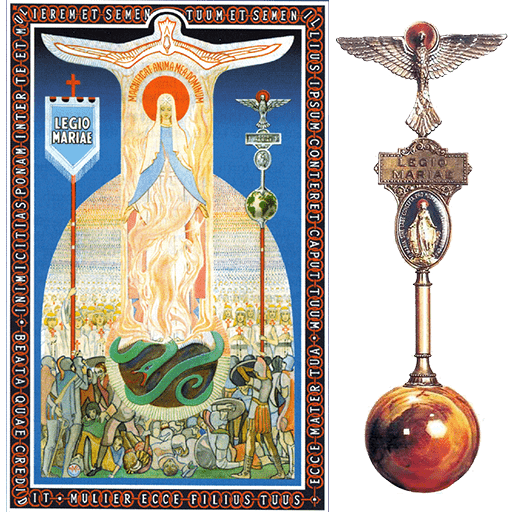Allocutio at Concilium - September 2013 by Fr. Bede McGregor, OP
The Universal Call to the Apostolate
Two of the great themes of the Second Vatican Council and of the Legion of Mary are the universal call to holiness and the universal call to the apostolate. The very first published words of Frank Duff were as follows: ‘In the heart of every right thinking Catholic, God has implanted the desire to become a Saint.’ Then he goes on to say with utter conviction: ‘Every person that is born is called to be a saint.’ So inevitably the first purpose of the Legion of Mary was to help people to become saints. That is still the primary and explicit aim of the Legion. If this is not in fact the deliberate and overwhelming objective of the individual legionary and every legionary grouping then the essential spirit of the Legion is no longer present. It is basic catholic and therefore Legion conviction that every one without any exception is called to be a saint that is to enjoy eternal life with God and each other through a genuine relationship with Christ. In other words the Legion was founded to help people to get into heaven or to put it more simply for the salvation of souls.
Now the immediate and inseparable consequence of the universal call to holiness is the universal call to the apostolate. There is no true sanctity without apostolate. Let us first quote from the Second Vatican Council as found in the Handbook: ‘From the fact of their union with Christ the head, flows the layman’s right and duty to be apostles. Inserted as they are in the mystical Body of Christ by baptism and strengthened by the power of the Holy Spirit in Confirmation. It is by the Lord Himself that they are assigned to the apostolate.’ Or ‘The individual apostolate, flowing generously from its source in a truly Christian life ... admits of no substitutes. Regardless of status, all lay persons (including those who have no opportunity or possibility for collaboration in associations) are called to this type of apostolate and obliged to engage in it.’
Frank Duff incessantly spoke and wrote about the possibility and necessity of a universal mobilisation to the Apostolate. So he says: ‘The doubter may question if such a universal mobilisation is a possible proposition. But if not, why did the Vatican Council order it? No Council would ever prescribe an unrealisable idealism. Very deliberately the Council proclaimed it is an essential duty of every Catholic that he must be apostolic and it made no exceptions. It went on to insist that it formed a primary part of her Episcopal and priestly duty that they organise the people to that apostolate. In fact unless that absolutely universal mobilisation be accomplished there is no chance of touching the un-approached millions of the earth.’ In other words if the universal call to apostolate were not a fundamental truth of our catholic faith, then it would not be realistically possible to fulfil the great commission of the Risen Lord to preach the Gospel to every creature.
Why am I stressing so much the universal call to apostolate? Well, the Legion was founded to help people fulfil this Gospel mandate. A Christian who is not engaged in the apostolate in some form or other is radically and essentially deficient in their Christian identity and is therefore not on the way to holiness. It is surely very tragic if a catholic shows no interest in where other people will spend eternity. The question arises: is it possible to save one’s own soul if one is not interested in the salvation of others. Can one be saved alone? It is these simple but profound truths that are at the heart of extension work and recruiting. We are inviting people to become seriously engaged in the salvation of souls. We are inviting them to take part in the task of evangelisation. I think we need to reflect often and deeply on the spiritual roots of our privilege of recruiting new members young, old and middle aged. Souls are at stake. Many people may never fulfil their Christian vocation and identity unless they join the Legion or some analogous organisation or movement. It is surely one of the best indicators of the spirit of the legion in any praesidium or higher council that they enthusiastically and habitually seek new members. We need to really believe that membership of the Legion is a most precious gift from God and from Mary and has tremendous consequences for happiness and fulfilment both in this life and for all eternity.
Let me conclude with some works from Blessed John Paul II, soon to be canonised, to young people but applicable to all of us: ‘Christ’s call leads along a way which is not easy to travel, because it can also lead us to the Cross. But there is no other way which leads to truth and which can give life. Nevertheless we are not alone on this path. Mary, through her fiat, opened a new way for humanity. By her acceptance of, and total dedication to the mission of her Son, she is the prototype of every Christian vocation. She will walk with us, she will be our travelling companion and with her help we will be capable of following the vocation which Christ offers us. Dear young people, let us set out upon our way with Mary, let us commit ourselves to Christ, the Way, the Truth, and Life. Thus we will be zealous bearers of the message of the new evangelisation and generous builders of the civilisation of love.’
********************************************************
